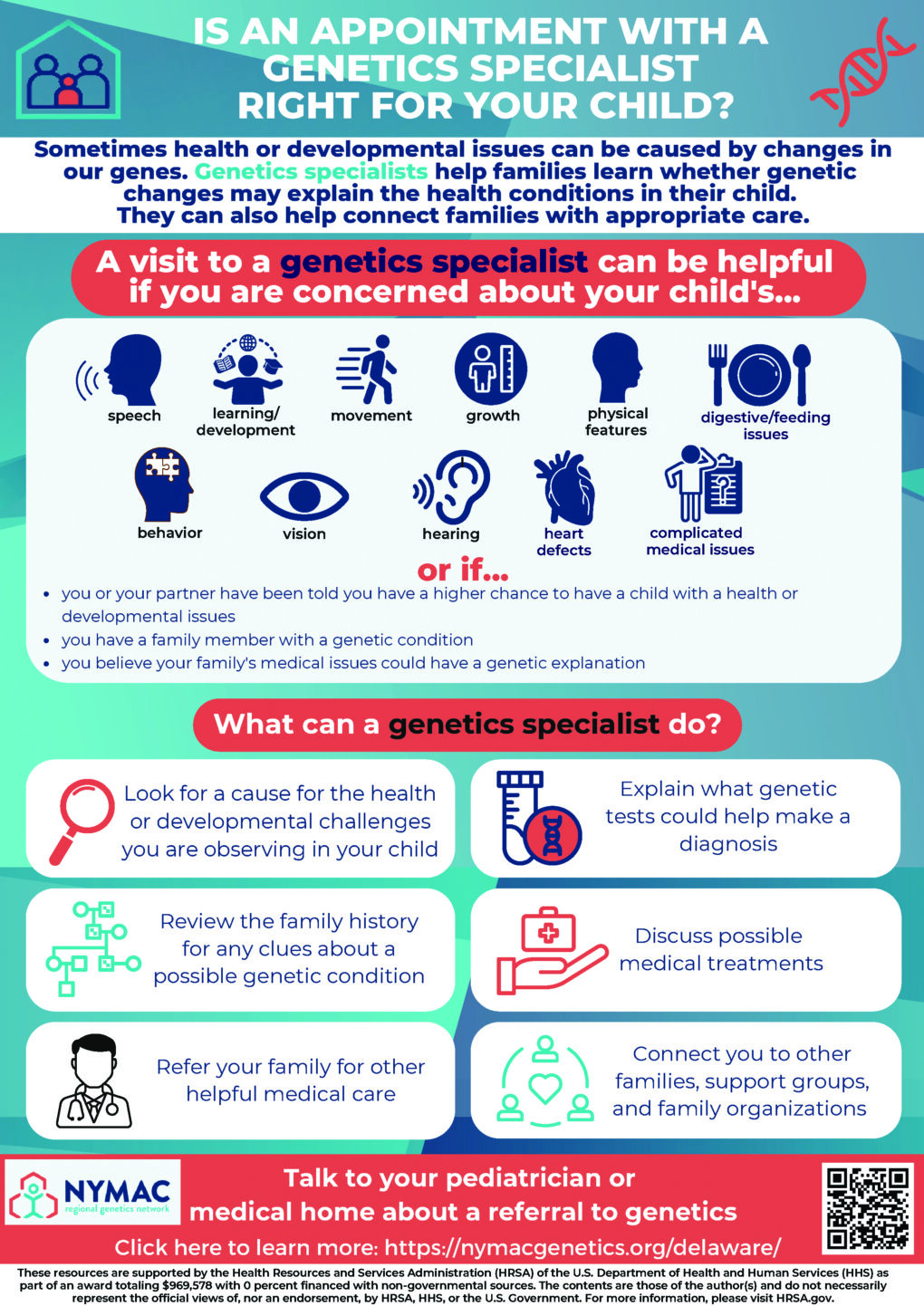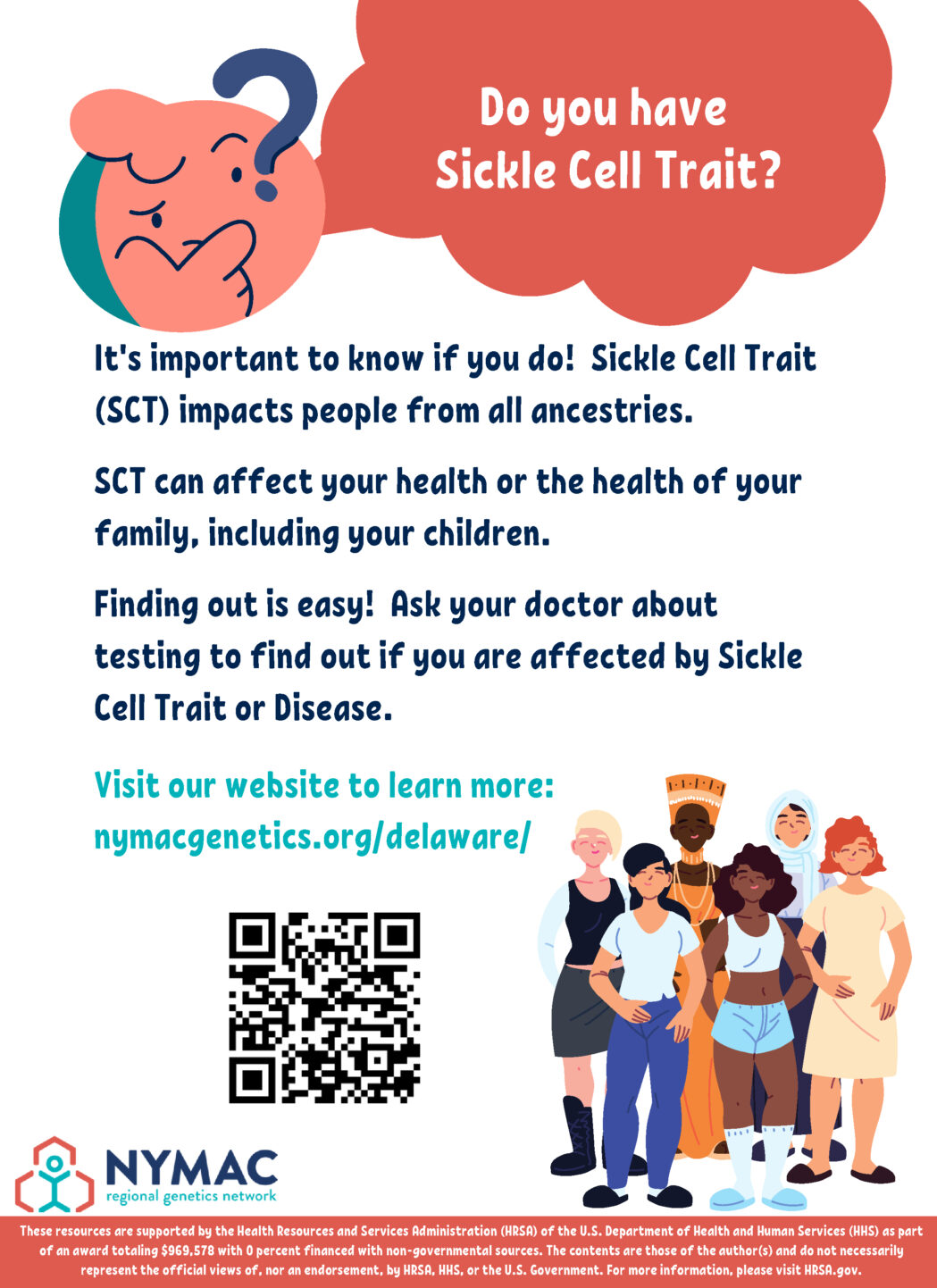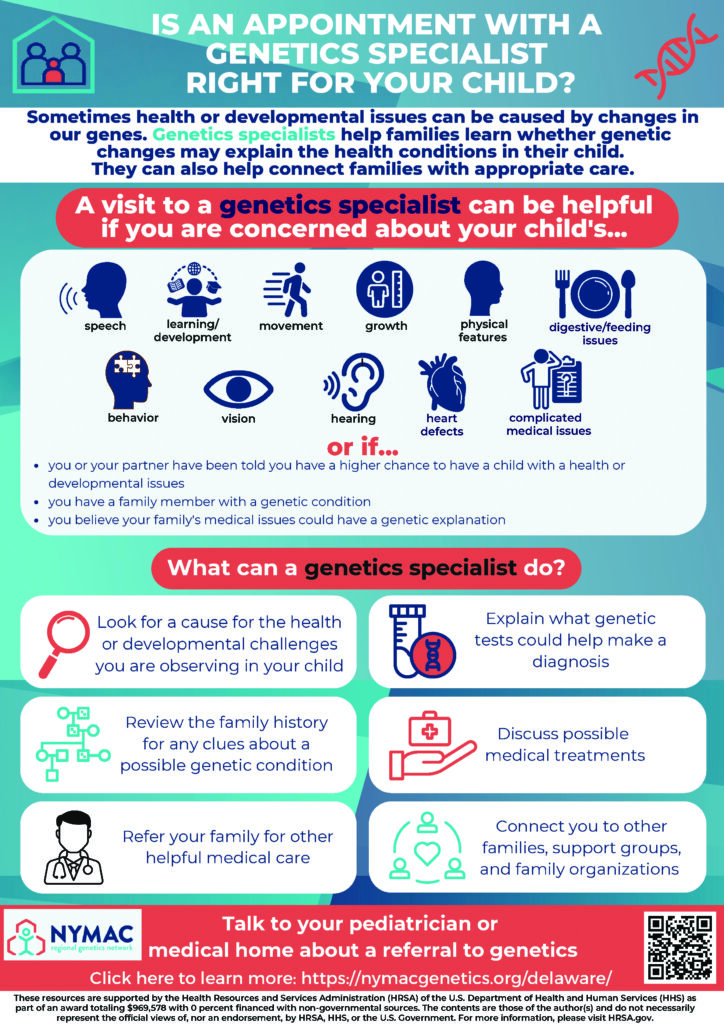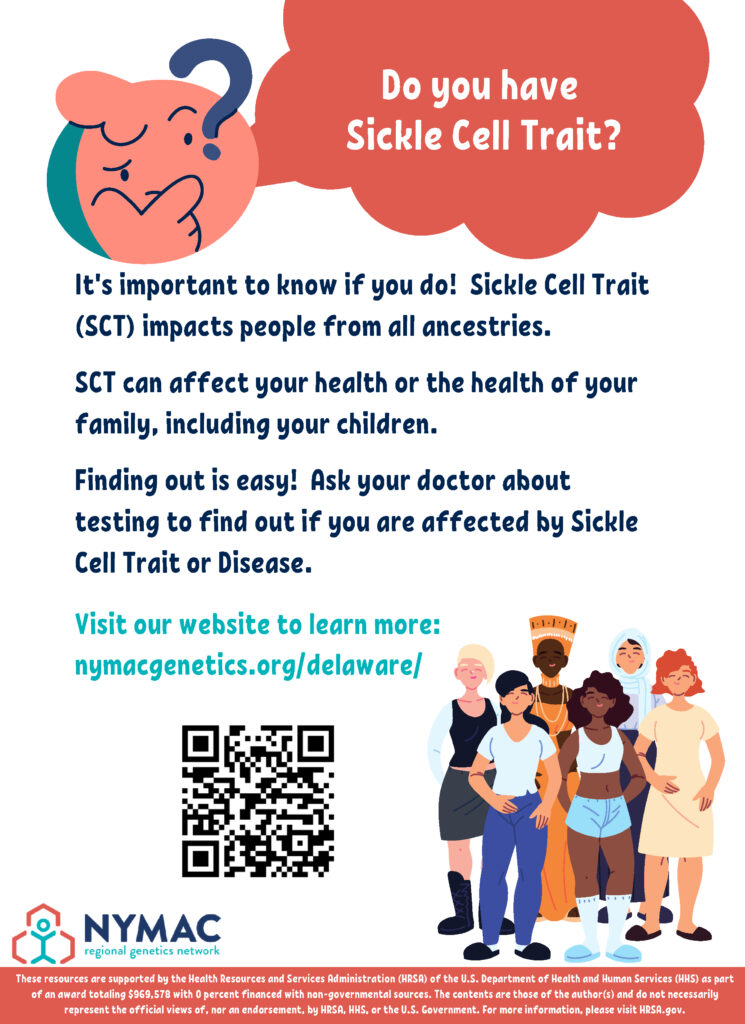Approximately 21.7% of children in Delaware have one or more special health care needs. Sometimes these health challenges can be caused by changes in our genes. Genetics providers help families learn whether genetic changes may explain the health conditions in their family and connect families to appropriate care.
- Genetic counseling is a process where you can learn more about genetic conditions and how they may be affecting you, your child, and your family.
- Meeting with a genetic specialist can help identify if a condition or symptom may have a genetic cause, who is at risk for inheriting these symptoms or conditions, and what genetic testing options are available.
- You may be interested in genetic counseling at various life stages, which includes planning for pregnancy, during pregnancy, childhood, adulthood, and late in life.
A genetic specialist is a medical professional that specializes in genetic conditions.
Genetic Specialists include Medical Geneticists, Genetic Counselors, Physician Assistants with specialization in Genetics, and Genetic Nurses
- Medical Geneticists are doctors that specialize in medical conditions that are hereditary or passed down through a family. They are trained to evaluate, diagnose, counsel manage, and treat individuals and families with genetic concerns and specific genetic conditions.
- Medical geneticists have a medical degree and are board certified by the American Board of Medical Genetics and Genomics (ABMGG).
- Genetic Counselors have training in medical genetics and counseling to guide and support patients who want information about their or their family’s risk for inherited diseases and conditions. They help individuals understand their genetic testing options based on their personal and family history and explain how the results of testing can impact the health of themselves and their families.
- Genetic counselors have a Master’s Degree in genetic counseling and are board certified by the American Board of Genetic Counseling (ABGC).
- Some physician assistants and nurses will take on extra training and education to increase their knowledge in the field of genetics and genomic medicine. These healthcare workers can aid genetics and genetic counselors during sessions.
- At a genetics appointment, you will often meet with a genetic counselor first.
- You will be asked detailed questions about your family history, you or your child’s medical history, and your child’s developmental history.
- Often a geneticist, a doctor who specializes in genetics, will join the session to do a physical exam, which may include some unusual measurements and possibly photos for documentation.
- You will likely be offered genetic testing. The genetic counselor and geneticist are trained in both genetics and counseling, so they will work with you to help you make the best decision for you.
- Every session can be slightly different!
If you are attending a prenatal genetics appointment, the appointment will be very similar to the one outlined above. However, the genetic testing options you may be offered typically include screening tests, such as cell-free DNA testing and carrier screening, or diagnostic tests such as an amniocentesis or a CVS (chorionic villus sampling).
- The total cost of the appointment with the genetic specialist and testing depends on type of coverage the patient has.
- Insurance co-pays for specialists are typically higher than going to see a primary healthcare provider. Patients may also need to pay for “facilities fees.”
- Medicaid/Medicare covers most services with little out of pocket costs to the patient.
- The costs of testing can vary based on the type of testing done and the patient’s insurance. If you chose to do genetic testing, your genetics clinic will work with you to find the genetic tests that have the least out of pocket costs.
- A patient or patient’s family may want to contact their insurance provider to get a better idea of the total potential costs of genetic counseling appointments and the costs associated with any potential genetic testing.
- Some patients may qualify for financial assistance programs to help cover the costs associated with genetic counseling and genetic testing.
Patients and families should also take into consideration if they will need to travel to get to their genetic counseling appointment.
- There is a limited amount of genetic counseling specialists, which means patients may have to travel far distances to their appointment(s).
- Some genetic specialists may be able to see their patients virtually using telehealth. When making your appointment, you can ask if this is an option.
Genetic Clinics in Delaware
Some sites may offer Telehealth/Telemedicine options depending on the type of appointment needed. Please ask when making the appointment.
RADfertility – A Member of the CCRM Network
Offices in Newark, Wilmington and Dover
Tel: 302-602-8822
https://radfertility.com
Delaware Center for Maternal & Fetal Medicine
Christiana Hospital, Women’s Building
Newark, DE 19718
Tel: 302-319-5680
https://christianacare.org/us/en/care/womens-healthcare/family-planning/genetic-consultation
ChristianaCare Prenatal Genetics Clinic
Rehoboth, DE
Tel: 302-623-4593, option 1
Nemours Children’s Hospital
Wilmington, DE
https://www.nemours.org/services/pediatric-genetics.html?location=naidhc#toggle-0
Medical Genetics Clinic: 302-651-5916
Skeletal Dysplasia Program: 302-651-4880
Nemours Cardiac Center: 302-651-6600
Center for Medical Genomics
Helen F. Graham Cancer Center & Research Institute
Newark, DE
Tel: 302-623-4593, option 1
1-800-811-8116
https://christianacare.org/services/cancer/cancersupportservices/geneticcounseling/
Nemours Children’s Hospital
Wilmington, DE
Pediatric Cancer Genetics Program: 302-651-5506
Tunnell Cancer Center**
Beebe Healthcare
Rehoboth Beach, DE 19971
Tel: (302) 645-3770
Penn Cancer Genetics Telegenetics**
BayHealth Medical Center
Dover, DE
Tel: (302) 744-6565
https://www.pennmedicine.org/cancer/navigating-cancer-care/programs-and-centers/telegenetics-program
**May require referral from local provider
Sickle Cell Info
It is important to know if you have sickle cell trait. About 1 out of every 12 African Americans has sickle cell trait and about 1 out of every 100 Hispanics has sickle cell trait. However, it is possible for a person of any race or nationality to have sickle cell trait. Please click on the links below for more information:
- Almost all babies born in Delaware are tested within 24-48 hours of birth for a number of conditions, including Sickle Cell Trait and Disease.
- If you were born in Delaware after 1993, your healthcare provider should be able to look up your result.
- If you were born outside of Delaware or before 1993 or your healthcare provider cannot find your result, testing is easy to do with a simple blood test called a Hemoglobin Electrophoresis.
Contact: Donna Monroe
Email: advocate4sc@gmail.com
Phone: 302-691-7724
For additional information or support for people with this conditions, please contact the following patient advocacy organizations:
- Sickle Cell Disease Association of American (www.sicklecelldisease.org )
- Sickle Cell Thalassemia Patient Network (sctpn.net )
- Cooley’s Anemia Foundation (www.cooleysanemia.org )
- Northern California Comprehensive Thalassemia Center at UCSF Benioff Children’s Hospital (thalassemia.com )
Resources for Children and Families with Genetic Conditions in DE:
Delaware Department of Health and Social Services (DHSS): The Delaware Department of Health and Social Services is an agency of the government of Delaware responsible for public health issues. It works to support and improve the health and safety through disease prevention, access to care, quality management, and community engagement. They have resources on assistance, disabilities, aging, medicaid, and many others. Delaware DHSS
Newborn Screening Program: The State of Delaware screens newborn infants for conditions that can cause serious illness, developmental delays, and even death if not detected in the first few weeks of life. They provide information on what conditions are screened for. Newborn Screening Program
Birth to Three Early Intervention Program: This government organization exists to assist children with developmental delays. They provide support, individual family service plans (IFSP), and convenient early intervention services. Birth to Three Early Intervention Program
Zero to THREE : Zero to Three works to ensure that babies and toddlers benefit from the family and community connections critical to their well-being and development. Healthy connections help build babies’ brains. Zero to Three
Division of Developmental Disabilities Services (DDDS): This government organization supports people with intellectual and developmental disabilities. They provide a network of providers including employment and vocational training, support coordination, community navigation, assistive technology, and many more. You can apply for these services and learn more on this website. Division of Developmental Disabilities Services
Delaware Special Education: The Delaware Department of Education provides information and resources for their special education program. This inclues individual education plans (IEPs) and other student support services. DE Special Education
Delaware’s Office of Children and Youth With Special Healthcare Needs (CYSHCN): The CYSHCN Program is a government organziation built to support children with special health care needs. They supply information on Autism, early intervnetion, assistive technologies, partner organizations, and many other resources. Delaware CYSHCN
Maternal and Child Health Bureau: The Maternal and Child Health Bureau strives to support women and children in their health needs. Their goal is to reduce inequities and improve health outcomes. They also provide resources for child and adolescent health as well as family planning and reproductive health. Maternal and Child Health Bureau
DE Thrives: DE Thrives is a government organization that provides resources to ensure the health of mothers and babies. They beleive that services should foster empowerment, equity, and and individually defined quality of life. They provide information on developmental screening, health equity, family planning, and many others. DE Thrives
Family Shade: Family shade is an organization that works to connect children with special healthcare needs with community resources. They provide a roadmap to services, community resources and organizations, as well as a way to search for providers. Family Shade
DE Medicaid and Medical Assistance: The Department of Health and Social Services provides information on what medicaid and medical assistance is and how to enroll. The site provides eligibility criteria and lays out step by step the procedure on how to apply. They help connect people and families to low cost or health care. DE Medicaid
Delaware Health Children Program: This organization provides health care to uninsured children up to the age of 19 at a low cost. This organization helps provide children and their parents the resources for applying for health care. This website has links to benefits, eligibility, and how to apply. DE Healthy Children Program
Parent Information Center of Delaware (PIC): PIC of Delaware is composed up of a team who really know how special education, advocacy, and schooling works within Delaware. They work to convey that information to the families in the state. They provide information and training for parents, connections to other families, youth leadership programs, professional development, and many others. Parent Information Center of Delaware
Delaware Family to Family: Delaware Family to Family provides Family Voices which has several programs. They have information for joining Parent to Parent. They provide support on navigating health and insurance systems, peer to peer emotional support, and support for families with children who have behavioral or emotional concerns. They also will connect you with other organizations if they cannot fullfill your needs DE Family to Family
The Arc: The Arc provides resources for parents of children with autism, cerebral palsy, spina bifida, ADD, epilepsy, Down syndrome, and more. It also provides resources for community involvement, child development, individuals with disabilities, and child-care services. The Arc
University of Delaware, Center for Disabilities Studies: Their mission is to enhance the lives of people and families through education and services for disabilities. They provide resources for assistive technology, education, transitions to adulthood, and autism initiatives. UD Center for Disabilities Studies
Autism: Autism Delaware
Down syndrome: Down Syndrome Association of Delaware

Meet the NYMAC DE Team
Genetics Clinics in DE
Resource Documents

Is An Appointment With A Genetics Specialist Right For Your Child?



